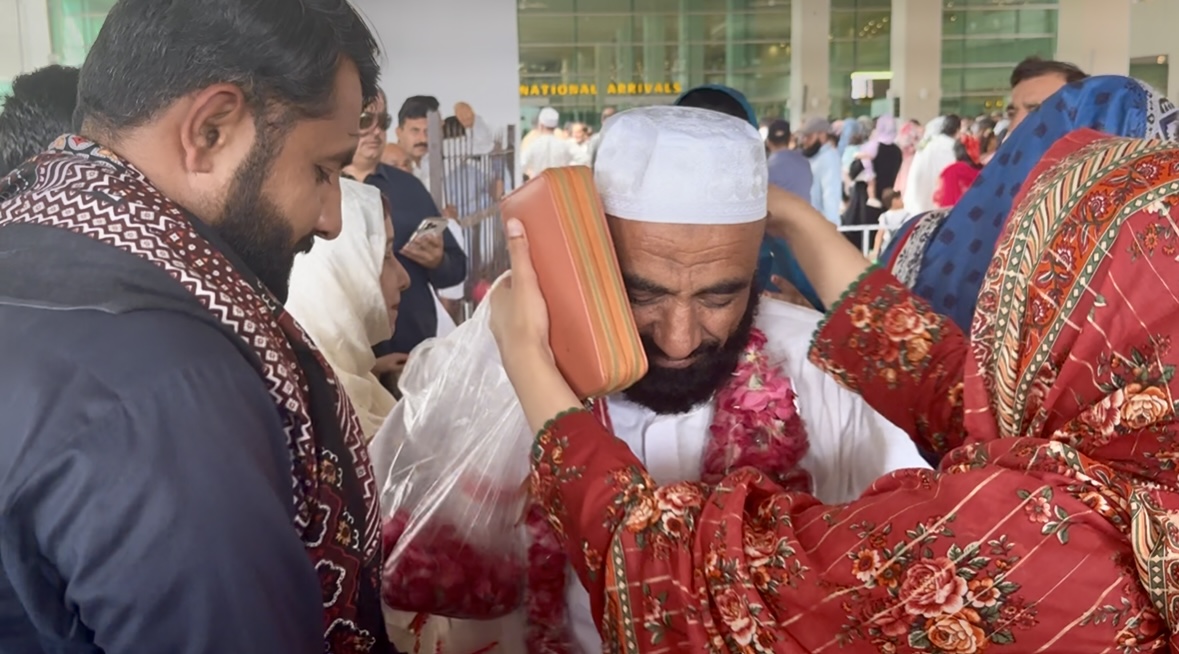ISLAMABAD: Pakistani pilgrims returning from ļ£Ĺ«÷Ī≤• on Wednesday praised the smooth organization and facilities provided during this year‚Äôs Hajj, despite facing intense heat in the holy cities of Makkah and Madinah.
Pakistan’s post-Hajj flight operation began with the arrival of PIA flight PK732 in Islamabad earlier in the day, carrying 307 pilgrims. According to the Ministry of Religious Affairs, a total of seven flights are scheduled to transport 1,496 pilgrims to Islamabad, Lahore, Multan and Karachi on the first day of the repatriation operation.
‚ÄúA total of seven flights carrying 1,496 pilgrims will land on June 11, while the post-Hajj flight operation will conclude on July 10 with the last flight landing in Islamabad,‚ÄĚ Muhammad Umer Butt, spokesperson for the religious affairs ministry, informed.
Speaking to Arab News at Islamabad International Airport, returning pilgrims praised the Hajj experience, describing it as spiritually uplifting and logistically smooth, crediting the Saudi authorities for their efforts.
‚ÄúIt [Hajj] was very good and an amazing experience,‚ÄĚ said Muhammad Waseem from Attock. ‚ÄúIt was very hot, but the Saudi government had made good arrangements‚ÄĒ there was water and fans everywhere.‚ÄĚ

Family members welcome Hajj pilgrims at the Islamabad International Airport in Islamabad on June 11, 2025, upon their return from Hajj. (AN Photo)
He said the Saudi authorities had taken excellent care of the pilgrims and ensured things remained smooth.
Those who followed their group schedules found the experience far less strenuous, he continued.
‚ÄúOnly those people got tired and faced difficulties who did not follow their scheduled timings fixed by the authorities for different groups for the Hajj rituals,‚ÄĚ he noted.
Abdul Malik, a pilgrim from Lakki Marwat in Khyber Pakhtunkhwa, echoed similar sentiments.

Family members welcome Hajj pilgrims at the Islamabad International Airport in Islamabad on June 11, 2025, upon their return from Hajj. (AN Photo)
‚ÄúThe arrangements were very good,‚ÄĚ he said. ‚ÄúWhen Allah calls a person to visit His House and the Mosque of His Prophet [PBUH], it feels as if the person is soaring in the air. Such is the feeling which cannot be described in words.‚ÄĚ
Samina Bibi from Islamabad called her Hajj deeply spiritual and fulfilling.
‚ÄúMy experience of Hajj was very good and I prayed for everyone, including all the Muslims,‚ÄĚ she said. ‚ÄúOnly Allah Almighty can understand my feelings during Hajj.‚ÄĚ
Bibi informed it was her second visit to the Holy Places, having previously performed Umrah, and found the arrangements to be ‚Äúvery good.‚ÄĚ
Abdul Haq, another pilgrim from Islamabad, reflected on the ease with which his journey unfolded.
‚ÄúWhen I intended to perform Hajj, after that, Allah made everything easy upon easy, and we prayed for everyone including Muslims sitting in front of the Holy Kaaba,‚ÄĚ he said. ‚ÄúThe arrangements made by the Saudi government were excellent. We faced no difficulties during Hajj.‚ÄĚ

Family members welcome Hajj pilgrims at the Islamabad International Airport in Islamabad on June 11, 2025, upon their return from Hajj. (AN Photo)
While he acknowledged the natural hardships due to the heat in Mina and Muzdalifah, Haq said the experience remained ‚Äúsmooth and truly unforgettable.‚ÄĚ
‚ÄúIn Hajj, there were not really difficulties, but there is hardship, mainly due to the heat,‚ÄĚ he added. ‚ÄúHowever, overall, our Hajj was so wonderful that it‚Äôs beyond words, and we kept thanking the Saudi government for all the arrangements throughout.‚ÄĚ
This year’s Hajj pilgrimage took place from June 4 to June 9, drawing millions of pilgrims to the holy cities.
Pakistan, which sent over 116,000 pilgrims under both government and private schemes, was among several countries managing large-scale contingents in the annual Islamic pilgrimage.



















